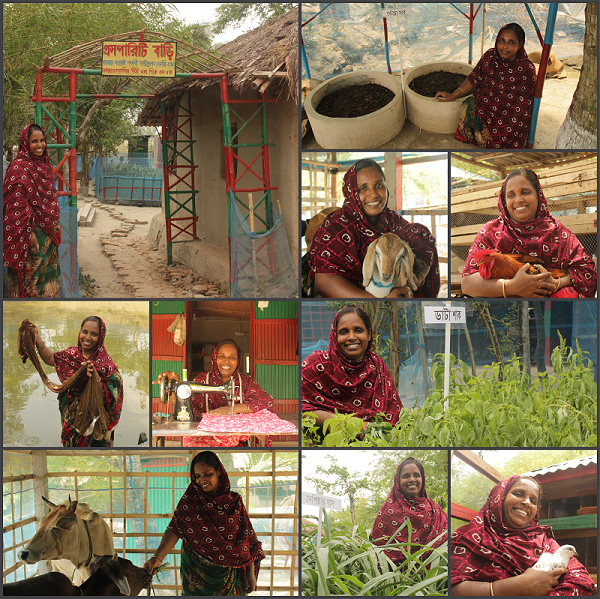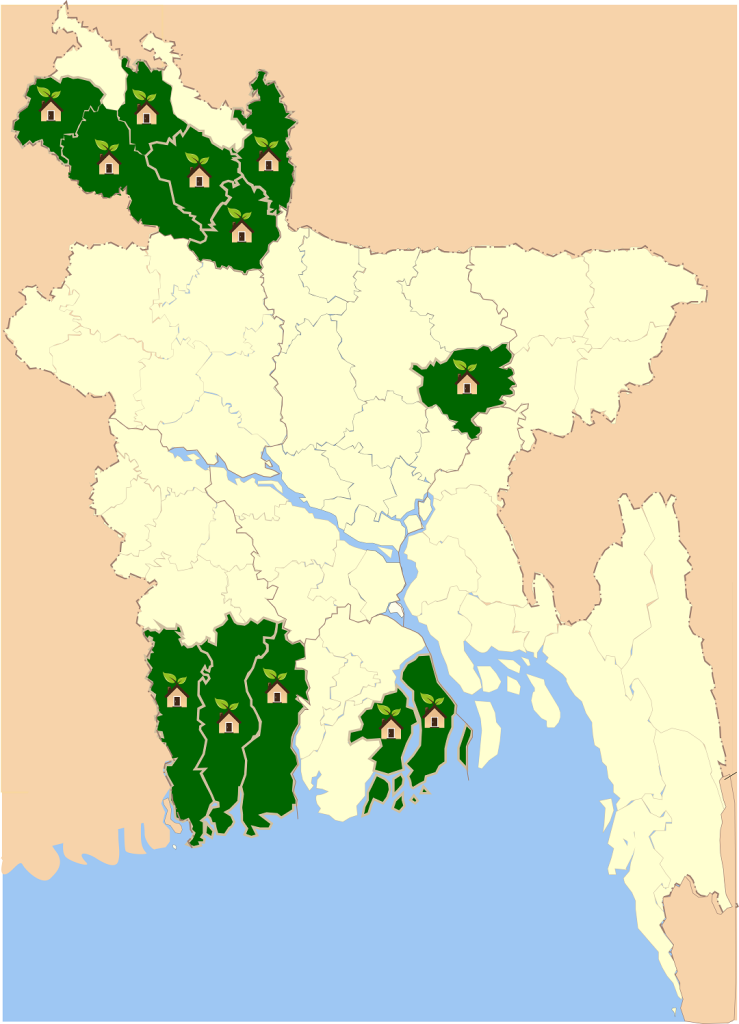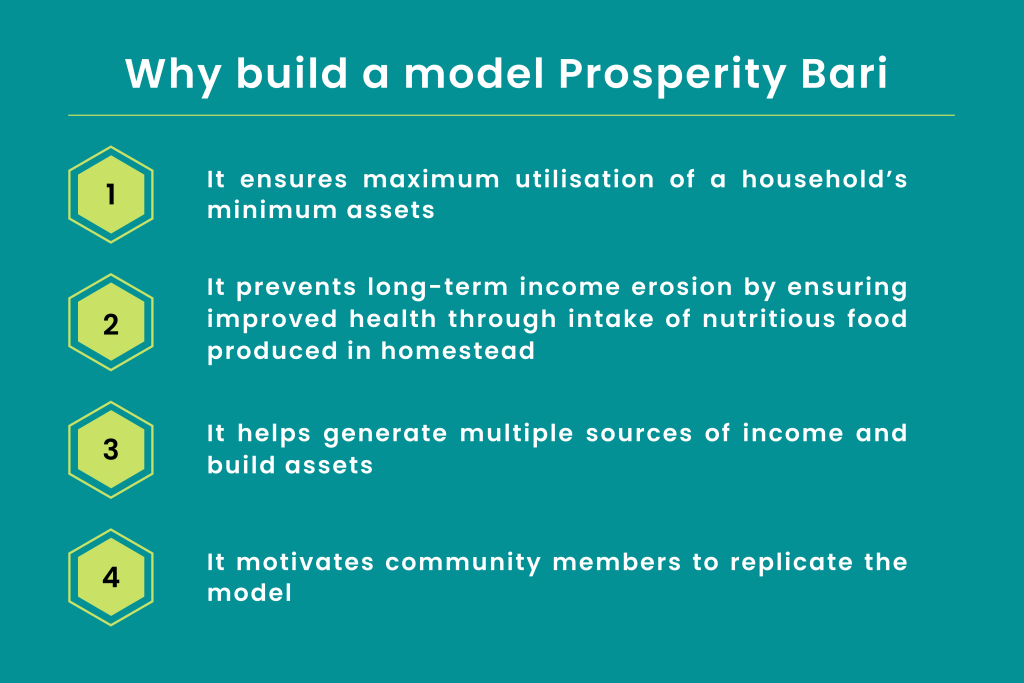
Extreme-poor people often fail to sustainably graduate out of poverty as they depend on a single income source for livelihoods. When these households have multiple sources of income, they can graduate faster, build assets quickly and scale up their successful income-generating activities for uninterrupted income gains. This in turn increases their ability to absorb shock and be resilient and prosper.
The project is applying this model across the 145 working unions, and has established 132 Prosperity Bari so far. Each of these households have at least seven types of IGAs, aimed at generating home-based food production and uninterrupted income from multiple sources to break the poverty cycle. Project participants receive grants support to start the IGAs as well as required skills training and regular technical support at their doorstep.
In Bhola district’s Char Kukrimukri area, for example, Shirina Begum’s four-member family had long been dependent on the daily income of her husband, an auto-rickshaw driver. Because his income is irregular, the family would often face financial hardships at times of crisis, such as health shocks and climate hazards, a common phenomenon in this climate vulnerable coastal area. The homestead and farm land they had were mostly unused for a lack of capital to start some homestead-based IGAs.
All this is changing now. Early this year, Shirina, a mother of two, received grants support from Prosperity project to turn her household into a Prosperity Bari. She is now implementing various farm and off-farm IGAs that are already contributing to income gains.

Pathways to Prosperity for Extremely Poor People (PPEPP), Prosperity for short, is working to tackle extreme poverty in rural Bangladesh for sustainable development of more than 200,000 extreme poor households mostly in climate-vulnerable districts. The project, aligned with UN’s Sustainable Development Goals (SDGs), provides support around climate resilient livelihoods, improved nutrition and primary healthcare, women empowerment, disability inclusion and access to public services.
Palli Karma-Sahayak Foundation is implementing the extreme-poverty project with funding form FCDO and EU.

IGA selection for these households is done on the basis of the specific geo-climatic features of the four regions covered by the project — Haor region, southwest coastal region, the plains in northeast region and ethnic minority regions in the north. Irrespective of the regional and geographical differences, a Prosperity Bari establishes at least seven IGAs following 3R (Reuse, Reduce and Recycle) approach to ensure maximum productivity with minimum resources. Form the start, households are provided with forward and backward market linkage support to ensure quality inputs and timely marketing and sale of the produce at the best possible price. On average, each Prosperity Bari established under the project is earning BDT 5,000-10,000 a month from the diverse range of IGAs.
Farm-based IGAs in a Prosperity Bari
Based on hazard mapping and livelihoods mapping, a combination of farm-based livelihood options such as livestock, fisheries and vegetables-related suitable IGAs are set up in Prosperity model houses.
Livestock: The project introduces livestock rearing, especially backyard livestock rearing, in a Prosperity model house. It is proven to be a viable livelihood option because both its cost and risks are minimal. The project supports the Prosperity Bari members to engage in a range of livestock-related IGAs including rearing of goats, cows, various kinds of poultry and ducks, pigeons, Turkeys, etc.
In addition to financial and technical support, the project ensures quality inputs such as sheds for the animals, fodder, disinfectant and medicine.
Fisheries: To generate additional incomes in addition to a round-the-year source of nutrition, small-scale aquaculture is a common livelihood feature in Prosperity model houses. The most common fisheries activities are high-value fish culture in tanks, fish culture in small ponds and ditches, and fishing gear production. The households are provided with hands-on training and direct input support (e.g. minnows, nets and fish food) to start fish farming.
Project’s technical officers visit all Prosperity Bari households periodically to provide hands-on training and technical support on livestock and fisheries-related fodder management and disease prevention. They also link the households with the local government service providers for additional technical support.
Vegetable garden: Homestead vegetable gardens meet the nutritional demand of the household alongside generating additional income through sale of the surplus produce in the local market. Prosperity members are motivated to utilise their unused land for vegetable cultivation and are provided essential technical knowledge and technologies such as vegetable, fruit and spice seedlings for greater production.
Off-farm IGAs in a Prosperity Bari
Many extremely poor households do not have land or experience to engage in farm-based livelihood opportunities, and some households often lose their farm-based livelihoods due to climate hazards. Considering the suitability and easy management, the project establishes off-farm IGAs in Prosperity model houses with relevant IGA-specific training for skill development. Members of each Prosperity Bari are provided with sewing machines to engage with tailoring. The households are also offered bamboo crafts, mat making, embroidery or fancywork and small business depending on their previous experience and skillset.
Video story: Selina Begum and her diverse, home-based livelihood options

